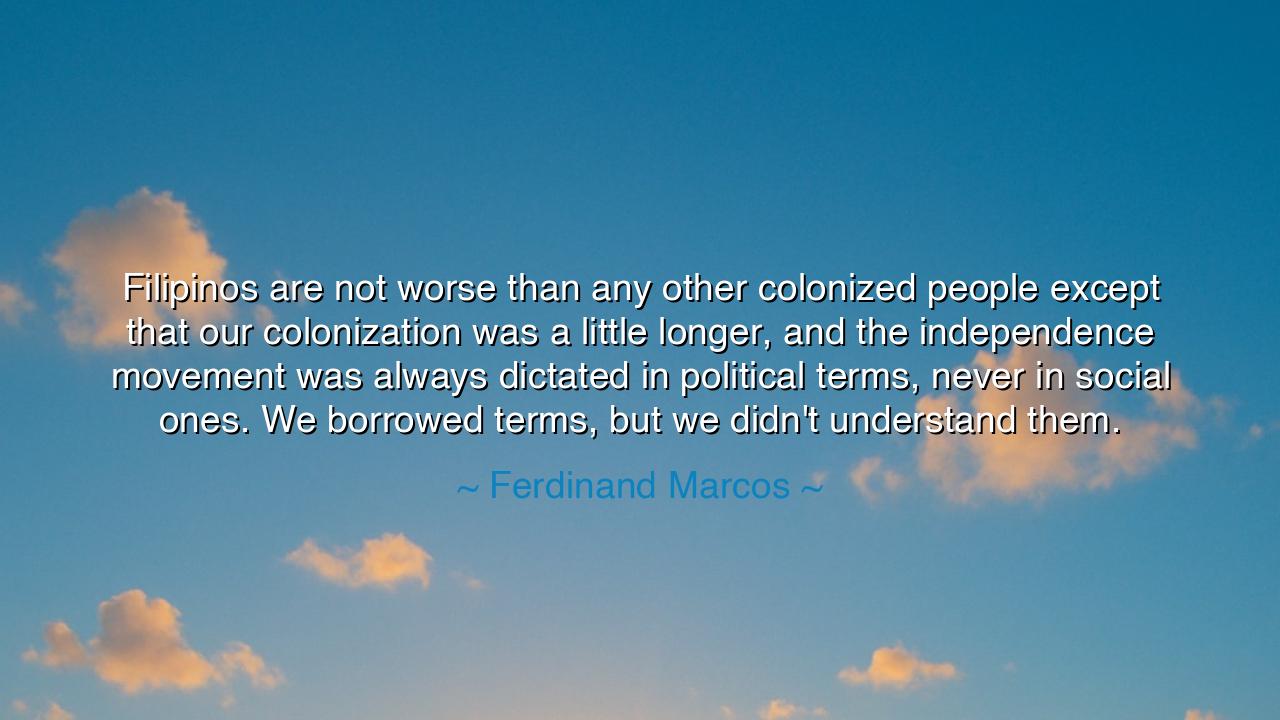
Filipinos are not worse than any other colonized people except
Filipinos are not worse than any other colonized people except that our colonization was a little longer, and the independence movement was always dictated in political terms, never in social ones. We borrowed terms, but we didn't understand them.






The words of Ferdinand Marcos, though spoken by a man both revered and reviled, resound with a complexity that pierces deep into the heart of a nation’s soul. When he said, “Filipinos are not worse than any other colonized people except that our colonization was a little longer, and the independence movement was always dictated in political terms, never in social ones. We borrowed terms, but we didn’t understand them,” he was not simply reflecting on history—he was dissecting the spiritual condition of a people shaped by centuries of subjugation. His words speak of a nation that gained freedom in form but still struggles for freedom in essence, a people who learned the language of liberty but not always its meaning.
To grasp the origin of this quote, we must return to the long and tumultuous story of the Philippines, a land colonized first by Spain for more than three centuries, and then by the United States for nearly half a century more. Under Spain, the Filipino people were baptized into Christianity but stripped of their ancient ways; under America, they were taught democracy, yet not the full practice of equality. When Ferdinand Marcos spoke these words in the latter half of the twentieth century, he was reflecting on the paradox of this history: that while the Philippines had achieved political independence in 1946, the soul of the nation remained captive—still influenced, still mimicking, still uncertain of its own identity. The chains of colonization had shifted from the wrists to the mind.
Marcos lamented that the Filipino struggle for independence had been shaped primarily by the vocabulary of its colonizers. The heroes of the revolution—noble and courageous as they were—fought for liberty in the language of the West. They spoke of republics and constitutions, of democracy and sovereignty, but these ideas were born from foreign soil. They were borrowed terms, as he said, “but we didn’t understand them.” The tragedy, Marcos implied, was that the nation had sought freedom without first understanding the deeper social foundations that sustain it: education, equality, self-discipline, and moral integrity. In this sense, independence was achieved in body but not in spirit.
Consider the story of the Philippine Revolution of 1896, led by men like Andres Bonifacio and Emilio Aguinaldo. They fought bravely against the Spanish Empire and, later, against the Americans who claimed to bring liberty while wielding power. Yet even within the revolution, there was division: Bonifacio, a man of the people, envisioned a more egalitarian and social transformation—one that uplifted the poor and redefined justice for all. Aguinaldo, influenced by European ideals and elite politics, pursued political independence but not necessarily social reform. When Bonifacio was executed by his own comrades, it symbolized a fracture that would echo through Filipino history—the victory of form over substance, of independence in law but not in life. Marcos’ words, whether cynical or insightful, pointed directly to that wound.
In the tone of the ancients, we may say: true independence does not come with the lowering of one flag and the raising of another—it begins in the liberation of the mind. A people can drive out conquerors from their land and still remain conquered in thought, still measuring their worth by foreign standards, still imitating rather than creating. Marcos saw that his nation’s greatest battle was not against colonizers, but against colonial mentality—the belief that greatness must always be borrowed, and that wisdom must always come from elsewhere. His lament was not merely historical but prophetic: for as long as a nation fails to root its freedom in its own moral and social soil, it will remain dependent, no matter what constitution it proclaims.
Yet his words must also be heard with discernment, for they came from a man who, in his own rule, tested the meaning of those very ideas. Marcos spoke of misunderstood freedom even as he ruled through authoritarianism, suspending the liberties he claimed to defend. This contradiction adds to the power of his statement—it forces the listener to confront the irony that those who speak most eloquently of independence may themselves corrupt it. And still, beneath his politics, there lies a kernel of truth: the Filipino struggle for dignity, identity, and self-knowledge remains unfinished. The task is not merely to be free, but to understand what freedom truly requires.
The lesson of this quote, therefore, is one of awakening: that every nation and every soul must examine whether its freedom is genuine or borrowed. Political liberation is the beginning, not the end, of the journey. Social independence—the freedom to think, to innovate, to stand on one’s own moral ground—is the fruit of education, culture, and conscience. A people who repeat the words of liberty without embodying its spirit will remain chained by imitation.
And so, the practical path is this: reclaim the power to define your own destiny. Learn deeply, not just from the books of others, but from the history, pain, and wisdom of your own people. Do not seek greatness in comparison to your conquerors, but in the flowering of your own humanity. As Ferdinand Marcos declared, the Filipino was never lesser than any other people—only burdened longer, and taught to dream through borrowed tongues. Let this generation, then, learn the meaning of those words anew—not merely to borrow freedom, but to understand it, to build it, and to live it until it is no longer imitation, but truth.






AAdministratorAdministrator
Welcome, honored guests. Please leave a comment, we will respond soon